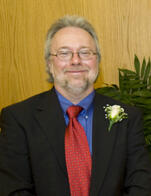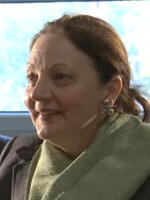March 21, 2012
Poetry Thrives at VCU
Pulitzer Winner Yusef Komunyakaa to Read at VCU on March 22
Share this story
Writers and poets may not be able to pinpoint exactly what makes Richmond a hotbed for poetry, but most would agree the city is undoubtedly a mecca for poets, with Virginia Commonwealth University at its very heart.
"Richmond is a city with a wealth not just of history, but of living, breathing talent, perhaps literary talent especially," said Gregory G. Kimbrell, membership & events coordinator with VCU Libraries and himself a poet. "Not every historical city thrives in this way, and I would say that we have VCU to thank for much of Richmond's vivacity. The nationally ranked MFA in Creative Writing Program continually brings to the literary community fresh faces to remind us all what it means to discover oneself as a writer, that good writing is not just about beautiful or important things, but about dedication and passion."
David Wojahn called the university a rich community for poetry.

"There are a lot of complementary ventures on the campus that really are focusing on trying to give requisite attention to poetry in general and poetry in Virginia, specifically," said Wojahn, a professor in the creative writing program in the Department of English.
The university's latest celebration of poetry takes place this week with a reading by Pulitzer Prize-winner Yusef Komunyakaa on Thursday, March 22.
Komunyakaa's often-autobiographical poems draw from diverse experiences and interests: the civil rights movement, classical literature, the Vietnam War, class struggle and jazz.
"He's really one of America's premier poets," Wojahn said. "He began in the 1980s and '90s to write a lot about his experience – and the American experience in general – about Vietnam. So he's known above all for the poems he's written about that conflict."
Events that bring writers such as Komunyakaa to campus serve two purposes: both encouraging students and offering something to the community.
"Creative-writing students need contact with the great poets in order to have examples to aspire to and to improve their work, and this means not just reading the classics, but also reading and hearing the great poets who are living and writing right now," Kimbrell said. "The community provides VCU so much moral and financial support, and we are always looking for ways of both saying thank you and inviting them to come back to visit us.
"These readings bring people from all across the city. I suppose that the stereotype of poetry readings is the coffee house in which only five people are actually paying attention to the poet sitting on the wooden stool in the spotlight, but these readings at VCU attract hundreds. In a world that often seems to think that poetry stopped being written after the beat generation, this is tremendously heartening."
The event, part of the English Department's Visiting Writers Series and sponsored by the VCU Friends of the Library, continues both entities' interest and commitment to promoting poetry in the community.
The English Department has "a nationally ranked creative writing program in poetry and in fiction. And so, we also bring a lot of visiting poets to campus," Wojahn said. "The Cabell Library has really been in recent years very interested in promoting poetry in Virginia and in trying to beef up its special collections to include a lot of poetry."
Among Cabell's more notable acquisitions are the papers of the late Larry Levis, a major American poet who taught at VCU at the end of his life.
The English Department's celebrated poets include Kathleen Graber, a National Book Award finalist whose many awards include the Library of Virginia’s Literary Award for Poetry, and Wojahn, a Pulitzer Prize finalist, three-time winner of the Pushcart Prize and recipient of the Carole Weinstein Prize in Poetry.

Student and alumni poets also have earned accolades for their works.
In 2006, the online literature and arts journal Blackbird — already a national presence among literary and poetry magazines — scored a coup when it featured a previously unpublished poem by the late Pulitzer Prize-winning poet Sylvia Plath.
That same year, VCU MFA alumni Elizabeth Seydel “Buffy” Morgan and Ron Smith were named co-winners of the first Carole Weinstein poetry prize, which rewards $10,000 to a Central Virginia poet annually for his or her contribution to the art of poetry. Smith and Morgan then became curators for the prize.
Other recent alumni honorees include Catherine MacDonald, who won the 2012 Miller Williams Arkansas Poetry Prize, and Anna Journey and Allison Titus, who each won NEA Literature Fellowships.
Why the university has devoted so much attention to poetry is simple, Wojahn said:
"I think it's a force that may not help people to live their lives in a better way, but it certainly helps them to endure their lives a little bit better. When you read a poem that you're moved by, impressed by, compelled by, you feel like the author of the poem is speaking only to you and no one else.
"As a poet myself, I feel very lucky to be in a place where I practice a discipline that's appreciated. And I think not every academician — even in a school that has a thriving creative writing program — would be able to say that, but I feel no reluctance in saying that about VCU."
Editor's Note: A Reading by Yusef Komunyakaa takes place Thursday, March 22, in the Singleton Center for the Performing Arts from 7 to 9 p.m., followed by a public reception and book signing. Doors open at 6:30 p.m. Books will be available for purchase at the event. The event is free and open to all, but because seating is limited, registration is required. For more information, visit http://www.library.vcu.edu/events/komunyakaa/.
Subscribe to VCU News
Subscribe to VCU News at newsletter.vcu.edu and receive a selection of stories, videos, photos, news clips and event listings in your inbox.










